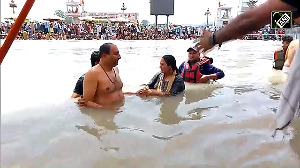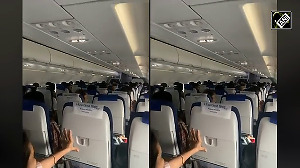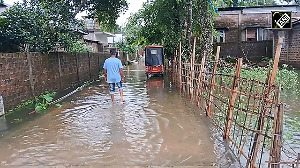"Congress would prefer President's rule, but it will never support the dissidents of the Bharatiya Janata Party," said a senior congress leader who is part of the Congress high command when asked about the dissident activities of the Gujarat unit of the BJP against its leader and Chief Minister Narendra Modi.
In view of Congress's insistence to keep a safe distance from BJP's 'civil war', the rebels of Gandhinagar will have to convince or force BJP president Lal Kishenchand Advani to replace Modi or accept President's rule.
The chances of Advani taking a decision against Modi soon are bleak. Advani himself is weaker than ever. Another point to consider is that during the controversy regarding his comments in Pakistan, Modi had backed Advani and insisted that he should not resign, but dilute his quotes concerning Mohammed Ali Jinnah.
While speaking off the record, a senior Congress MP from Gujarat said, "In the long-term interest of Congress, we will neither like to support them from the outside nor would we like to support them in any other manner even if they form a two-third majority."
"It will be a different game if an anti-Modi group can muster 90 members. In that case Modi's survival is difficult," the senior Congress MP continued.
According to observers, on the latest round, the dissident activity against Modi is fueled by Pravin Toghadia, leader of the Visha Hindu Parishad. Believe it or not, one of the root causes of Modi's trouble is that the VHP cadre and local Rashtriya Swayamsevak Sangh functionaries and many BJP leaders consider him to be 'a fake Hindutva hero'. It is a charge Modi can neither accept nor deny.
Keshubhai Patel, former chief minister and the seniormost leader of the BJP in Gujarat is trying to hit back at Modi as much as he can because he thinks it is his last chance. Modi had replaced him unceremoniously and Patel has never forgiven him for that.
In this 'do or die" situation, on August 16, at his residence Keshubhai could muster an impressive strength of 45 MLAs who are displeased with Modi and who want Modi to go.
Their grouses are not many. They think that Modi is 'absolutely insensitive' to the party cadre and that he is not doing enough for the party.
One BJP MLAs said, "We are fed up of his arrogance, his insults and his insensitivity to party structure."
He said, "As a rule, he never accepts any demand of MLAs. He likes non-political nominees in powerful positions, which we can't accept."
But Keshubhai, who is ageing, has a limited hold on the Patel community. Patels form the strongest political and economic force of Gujarat. Keshubhai sees in this his chances of revival.
In Gordhanbhai Zadaphia, he has got another Patel to take on Modi. Togadia, who is supporting Keshubhai, is also a Patel. As the political game is played out, Keshubhai is unlikely to gain, but a 'dark horse' could benefit.
Patels and vested interests in Gujarat have complaints against Modi's handling of the economy and his style of governance.
Of course, no one denies the fact that Modi has behaved badly with his party and its leaders. But nevertheless, who can bell the cat?
Modi is certainly facing anti-incumbency and is also unpopular among certain sections, particularly amongst farmers and poorer sections, but it can't be said that middle class-urban people, who supported him in 2002 in spite of bloody riots or people who supported him because of the riots, have deserted him. Not yet, says most observers.
Many people think that Modi, at some point of time, will be held guilty for the Gujarat riots and like Jagdish Tytler, he may have to go one day.
But the fact that many people overlook is that Modi is not facing any criminal trial whatsoever in any Indian court over the Gujarat riots.
Indira Jaising, a distinguished lawyer of the Supreme Court, has filed one case, on behalf of a non resident Gujarati, asking to fix responsibility against him for the riots in a court in Himmat Nagar near Mehsana. But she has raised a bigger and crucial issue of fixing responsibility of the political authority during riots and a decision regarding it will take decades by the Indian standard of justice.
More than 10,000 affidavits have been filed in various courts after the Godhra carnage and the riots of 2002. But, Modi is nowhere mentioned in it.
How can he be proven guilty without any case pending against him? Where does the question of his resignation arise?
A senior retired judge of Supreme Court told rediff.com, "Legally speaking, Modi is not an accused nor does his name figures anywhere in those lakhs of words filed before the Nanavati-Shah Commission."
So, the taming of Modi with help of the Nanavati-Shah Commission may not be a realistic political option.
BJP president L K Advani and former prime minister Atal Bihari Vajpayee can tame Modi, but in view of the coming events to celebrate the party's silver jubilee, the sacking of Modi looks like an awkward option.
Nevertheless, since he has won the election, for the first time Modi, that controversy-prone leader, is in serious trouble.






